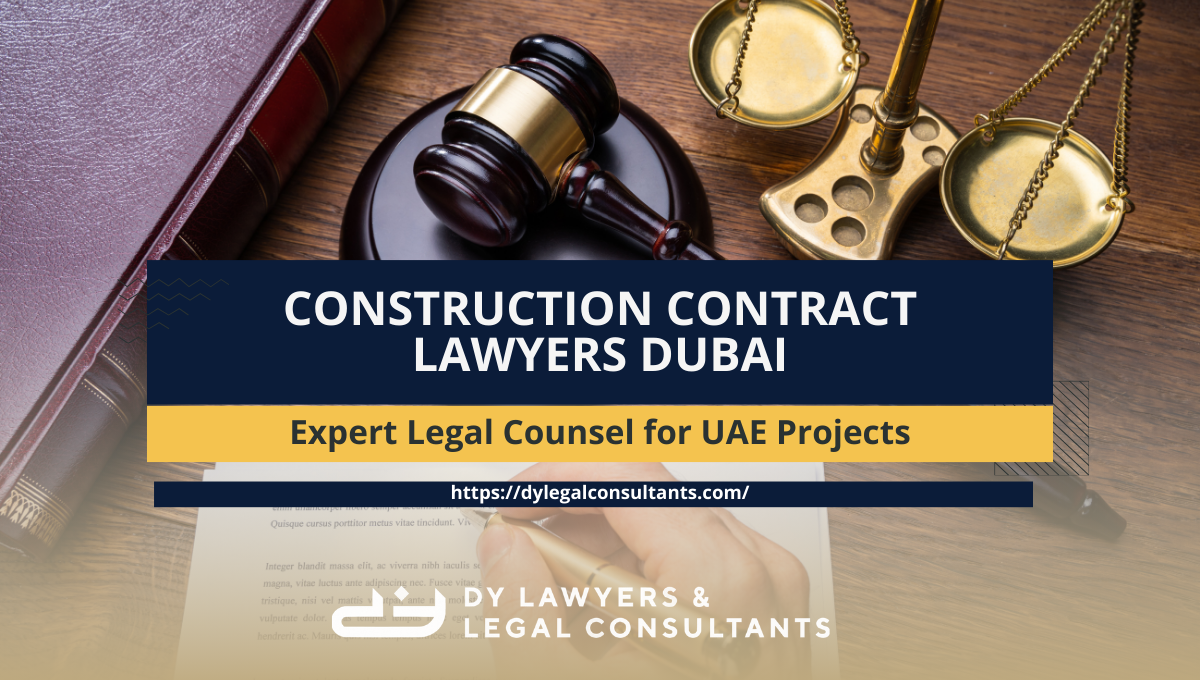Navigating the intricate landscape of construction contracts in Dubai and the wider UAE demands specialized legal expertise. The UAE’s dynamic construction sector, driven by ambitious projects and rapid development, presents unique challenges and opportunities.
The firm stands as a leading provider of legal counsel in construction contracts in Dubai, dedicated to offering comprehensive and strategic legal solutions for developers, contractors, consultants, and investors throughout the Emirates. The team of seasoned legal professionals possesses a deep understanding of local regulations, international standards like FIDIC, and the nuances of the UAE Civil Code, ensuring that projects are built on a solid legal foundation from inception to completion.
Also Read: Property Transfer Procedure in Dubai
Why Choose DY Lawyers and Legal Consultants?
When clients partner with DY Lawyers and Legal Consultants, they gain more than just legal representation; they gain a strategic ally committed to their success.
Unrivalled Local Expertise
Our law firm’s profound knowledge of UAE federal laws, specific Dubai regulations (including those issued by RERA and Dubai Municipality), and intricate local court procedures is unparalleled. The legal professionals are not merely familiar with the statutes; they are deeply immersed in their practical application and evolving interpretations within the dynamic Dubai construction market.
This practical immersion is essential given the competitive legal landscape in Dubai, where numerous firms specialize in construction law. Understanding how laws are interpreted and enforced in local courts and by regulatory bodies is crucial for effective representation. This deep understanding allows the firm to navigate the real-world complexities of the Dubai construction sector, fostering greater confidence with potential clients.
Extensive Industry Experience
Our law firm has advised on and successfully navigated the legal complexities of a diverse range of projects, from iconic mega-developments and high-rise towers to critical infrastructure projects and intricate commercial ventures across the UAE. The experience spans every stage of the construction lifecycle, involving collaboration with all key stakeholders, including employers, contractors, subcontractors, and consultants.
The scale and complexity of projects common in Dubai, such as those handled by prominent firms on mega-developments, underscore the necessity of this comprehensive capability. Demonstrating a track record with projects of varying scales assures potential clients that the firm possesses the depth of knowledge to handle their specific legal challenges.
Proactive & Client-Centric Approach
Our law firm’s philosophy centers on preventing disputes before they escalate. A proactive and client-centric approach is adopted, focusing on meticulous contract drafting, thorough risk assessment, and providing tailored, preventative legal advice. This strategy is designed to safeguard client interests, minimize potential liabilities, and achieve commercial objectives efficiently and effectively.
This proactive methodology is particularly valuable in the UAE, where the principles of “good faith” (Article 246 of the UAE Civil Code) and judicial discretion over contractual terms, such as liquidated damages (Article 390 of the UAE Civil Code), can introduce an element of unpredictability in dispute resolution. By anticipating these judicial interpretations and structuring contracts accordingly, the firm offers a superior, more predictable, and ultimately more cost-effective service, transforming potential legal uncertainties into strategic advantages for clients.
Proven Track Record
The firm boasts a strong and demonstrable history of successfully resolving complex construction disputes in Dubai. Whether through strategic and commercially astute negotiation, efficient and effective arbitration proceedings, or robust and assertive litigation, the firm consistently strives for cost-effective and timely resolutions that align with client commercial goals.
The enactment of Federal Law No. 6 of 2018 on Arbitration has significantly simplified the enforcement of arbitral awards in the UAE, making arbitration a more attractive, efficient, and reliable mechanism for dispute resolution. Furthermore, the Dubai International Arbitration Centre (DIAC)’s recent modernization, including its new 2022 Arbitration Rules and its default seat in the DIFC (with DIFC Courts acting as supervisory courts), further enhances its appeal for complex construction disputes, offering a common law procedural environment that can be particularly appealing to international parties.
The active handling of construction cases by the specialized Technology and Construction Division within the DIFC Courts also provides a dedicated and sophisticated forum for complex construction disputes.10 The firm’s ability to competently navigate both onshore and offshore court systems is a significant strategic advantage, offering clients comprehensive options.
Multilingual Capabilities
Operating within Dubai’s incredibly diverse and international business environment, the team offers services in [list languages, e.g., English, Arabic, German, Hindi, Urdu]. This ensures seamless and clear communication, fostering a deeper understanding and stronger relationships with both international and local clients.
Dubai is recognized as one of the most cosmopolitan cities globally, home to over 200 nationalities, which directly supports the necessity of multilingual capabilities for effective client engagement. This capability is not merely an added benefit but an essential operational requirement for serving a truly global client base.
Also Read: Clearer Look at RAK ICC Foundations and Their 2025 Updates for Global Wealth

Comprehensive Construction Contract Legal Services in the UAE
The firm’s expertise covers the full spectrum of legal services required in the construction sector, ensuring robust legal support at every phase of a project.
Construction Contract Drafting & Review
A meticulously drafted and reviewed contract serves as a project’s foundational legal defense. The firm provides comprehensive drafting and review services for all types of construction agreements, ensuring absolute clarity, legal enforceability, and proactive risk mitigation.
FIDIC Contracts
Expert drafting, thorough review, and strategic negotiation services are offered for all FIDIC forms (including the Red Book, Yellow Book, Silver Book, and other specialized editions). The approach meticulously tailors these international standard forms to specific project requirements while ensuring full compliance with the unique legal context and prevailing laws of the UAE. While FIDIC contracts are widely used and recognized in the UAE, they are not immune to the overriding principles of UAE public order laws.
The firm’s expertise lies in localizing these international forms, understanding how local legal principles (such as those governing good faith and liquidated damages) might modify or override standard FIDIC terms, thereby ensuring their enforceability and effectiveness within the UAE legal framework. This is a critical nuance for international clients accustomed to pure common law interpretations of FIDIC.
Bespoke & Local Contracts
The firm specializes in crafting customized agreements for various project delivery models, including design-build, EPC (Engineering, Procurement, and Construction), lump sum, cost-plus, and more. All bespoke contracts are meticulously drafted to adhere strictly to UAE legal requirements and best practices.
Also Read: Expert Business Partnership Dispute Lawyer in Dubai
Ancillary Agreements
Services extend to drafting and reviewing all necessary ancillary agreements that support a construction project. This includes, but is not limited to, Joint Venture Agreements, Subcontractor Agreements, Supply Contracts, and Consultancy Agreements for key professionals such as architects, engineers, and project managers.
The acknowledged inadequacy of UAE Civil Code Articles 890 and 891 regarding subcontracting highlights the critical need for carefully drafted and comprehensive ancillary agreements. This is particularly important for managing liabilities and defining relationships, especially in scenarios involving nominated subcontractors, where the statutory framework is less clear.
Key Clause Optimization
Key contractual clauses are meticulously optimized to ensure maximum protection and clarity for clients. This includes robust provisions covering payment terms, liquidated damages, force majeure events, variation orders, defects liability periods, and comprehensive dispute resolution mechanisms.
Given the significant judicial discretion over liquidated damages under Article 390 and the overarching application of good faith under Article 246, optimizing these clauses goes beyond mere precise wording. It requires advising clients on the likely judicial interpretation in the UAE, the importance of maintaining strong evidence of actual loss (for liquidated damages), and the necessity of acting in good faith throughout the project lifecycle to ensure the enforceability and desired outcome of these clauses.
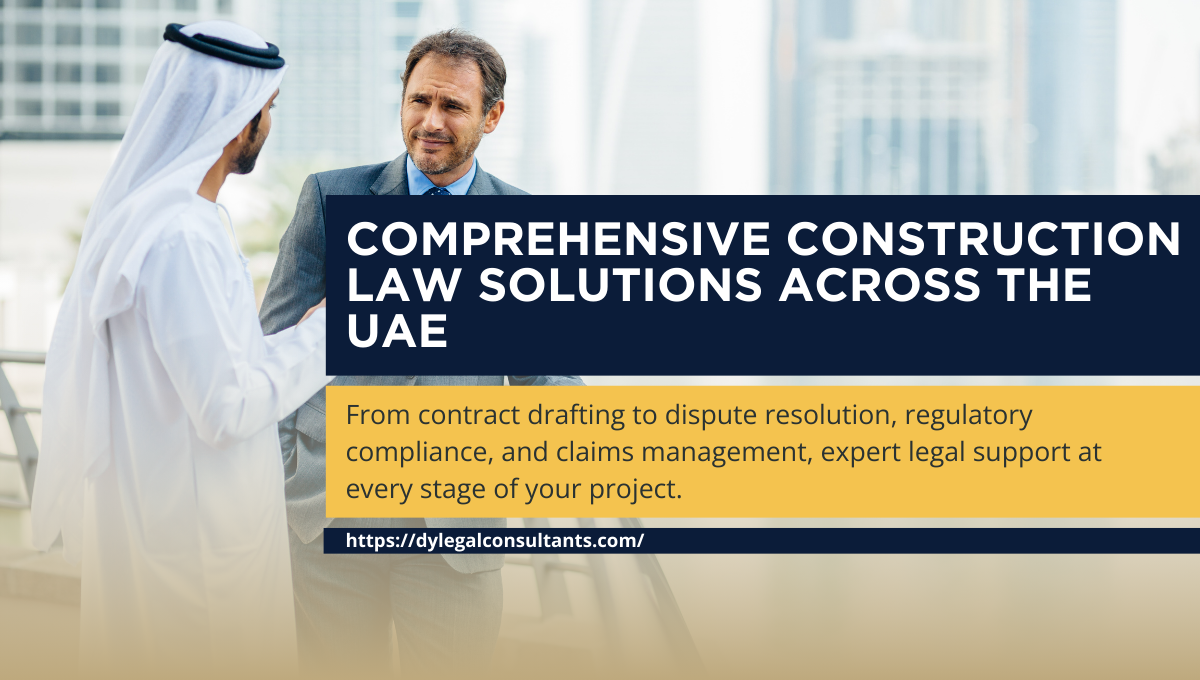
Construction Dispute Resolution
When construction disputes inevitably arise, the primary focus is on achieving favorable outcomes for clients efficiently and strategically. Expert and effective representation is offered across all available dispute resolution forums in the UAE.
Negotiation & Mediation
Amicable and commercially sensible solutions are actively pursued through expert negotiation and structured mediation processes. The goal is to resolve disputes collaboratively, preserving valuable business relationships wherever commercially viable.
Arbitration
Comprehensive representation is provided for clients in both domestic and international arbitration proceedings. This includes proceedings before prominent institutions such as the Dubai International Arbitration Centre (DIAC), the Abu Dhabi Commercial Conciliation and Arbitration Centre (ADCCAC), and ICC Arbitration. The firm leverages its in-depth understanding of the specific arbitration rules and procedures governing each forum.
The enactment of Federal Law No. 6 of 2018 on Arbitration has significantly simplified the enforcement of arbitral awards in the UAE, establishing a more arbitration-friendly framework. Furthermore, DIAC’s recent modernization, including its new 2022 Arbitration Rules and its default seat in the DIFC (with DIFC Courts acting as supervisory courts), further enhances its appeal for complex construction disputes, offering a common law procedural environment that can be particularly appealing to international parties. This trend reinforces arbitration as a leading option for dispute resolution in the UAE.
Litigation
Aggressive and robust representation is provided for clients in litigation before the onshore Dubai Courts (Court of First Instance, Court of Appeal, Court of Cassation) and the offshore DIFC Courts, including their specialized Technology and Construction Division. The existence and active handling of construction cases by the specialized Technology and Construction Division within the DIFC Courts provides a dedicated and sophisticated forum for complex construction disputes.
This division often operates under common law principles, which can be preferred by international entities over the civil law system of the local Dubai Courts for certain types of disputes. The firm’s ability to competently navigate both onshore and offshore court systems is a significant strategic advantage, offering clients comprehensive options.
Construction Claims Management
Expert assistance is provided to clients in navigating the complexities of construction claims, meticulously preparing and defending claims to maximize recovery and minimize exposure to liabilities.
Delay & Disruption Claims
The team offers expert analysis, prosecution, and defense of claims related to project delays and productivity loss. This includes assessing entitlement to extensions of time and additional costs. Understanding the intricate nuances of concurrent delay and the strict application of FIDIC Sub-Clause 20.1 (time bar for claims) is crucial for effective delay claims management in the UAE.
The strict notice provisions outlined in FIDIC can, if not adhered to meticulously, provide a complete defense for employers against a contractor’s claim for time or money, highlighting the critical importance of procedural compliance.
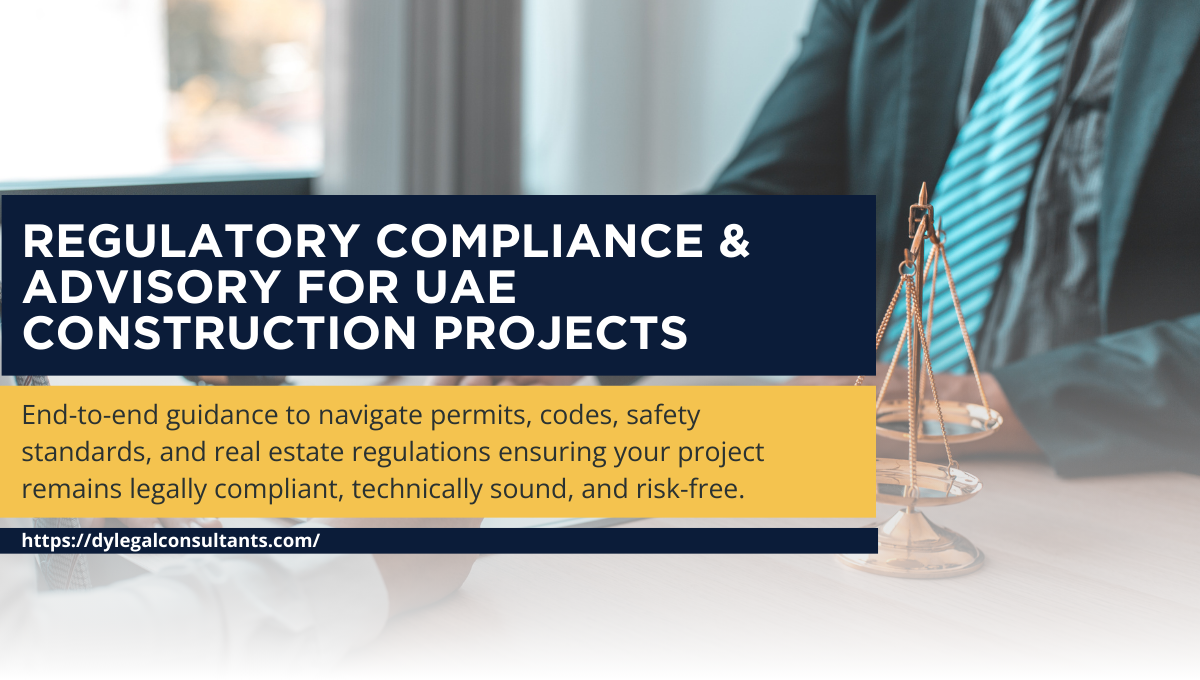
Payment Disputes
Issues concerning non-payment, delayed payments, and complex final account disputes are adeptly resolved, ensuring clients receive their rightful entitlements.
Variation & Change Order Claims
Comprehensive advice is provided on contractual entitlements for changes in project scope and cost, ensuring that variations are properly documented, valued, and claimed or defended. The UAE Civil Code, particularly concerning Muqawala contracts, emphasizes the importance of immediate notification for variations.
Failure on the part of the contractor to notify the employer “immediately” can result in the loss of their right to future claims related to such variations. This highlights a critical procedural detail that can significantly impact the success of variation claims.
Defect Claims
Claims related to defective works, including issues of compliance with specifications and materials, are expertly addressed, with particular expertise in navigating the stringent provisions of Decennial Liability under UAE law. Decennial Liability (Article 880 of the UAE Civil Code) imposes a strict, joint and several liability on both the architect and contractor for ten years from project handover for any total or partial collapse of a building or any serious defect threatening its stability and safety.
This long-term and stringent liability underscores the critical importance of robust quality control, clear contractual provisions defining scope and responsibility, and comprehensive professional indemnity insurance for all parties involved in the design and construction process. This liability also directly links to the 10-year document retention requirement under the upcoming Dubai Law No. 7 of 2025, ensuring evidence is available for the full liability period.
Regulatory Compliance & Advisory
Staying fully compliant with the UAE’s dynamic and evolving regulatory landscape is paramount for the success and continuity of any construction project. Proactive and ongoing advisory services are provided on:
Building Permits, Licenses, and Approvals
Clients are guided through the complex processes of obtaining all necessary building permits, operational licenses, and regulatory approvals from relevant authorities. Dubai Municipality imposes detailed and stringent permit and licensing requirements for all types of construction projects, including new builds, extensions, and significant renovations. Non-compliance with these regulations can lead to severe penalties, including stop-work orders, substantial fines, and even legal action, highlighting the critical importance of meticulous adherence.
Adherence to Building Codes, Health and Safety Regulations, and Environmental Standards
This includes ensuring full compliance with the Dubai Building Code (DBC), as well as all applicable health, safety, and environmental protection standards. Dubai Municipality’s regulatory control is highly granular, extending to specific technical requirements (e.g., approved tensile strands, minimum concrete thickness, specific grouting mixtures) and mandating the use of approved smart applications and licensed professionals for structural designs.
This level of technical compliance adds a significant and often overlooked layer of legal risk, requiring specialized legal and technical understanding to ensure adherence and avoid potential violations during construction.
Navigating the Intersection of Construction Law with Property and Real Estate Laws
Expert guidance is provided on the complex interplay between construction law and broader property and real estate regulations, including the significant implications of RERA (Real Estate Regulatory Agency) for developers. RERA plays a crucial and expansive role in regulating developers and real estate transactions, with its rules directly impacting the commercial viability and legal compliance of construction projects, particularly those involving off-plan sales.24 Compliance with RERA’s evolving requirements (e.g., completion milestones for off-plan sales, developer registration) is essential for developers to operate legally and successfully.
Critical Update: Dubai Law No. 7 of 2025 Regulating Contracting Activities
This groundbreaking new law, scheduled to enter into force on January 8, 2026, represents a significant regulatory overhaul for the entire contracting sector in Dubai. It introduces a unified regulatory framework, establishes a new classification system for contractors, mandates a formal Code of Conduct and Ethics, and enhances document retention requirements.
This law is not just a minor amendment but a major regulatory shift. Its comprehensive nature (affecting contractor classification, ethics, digital registration, and document retention) will create new and substantial compliance burdens and strategic considerations for all existing and new contractors in Dubai. The firm provides proactive and timely advice to ensure clients are fully prepared for and compliant with these critical upcoming changes, minimizing disruption and ensuring continuity of operations.
Common Construction Contract Disputes Handled in Dubai
Extensive experience encompasses the full spectrum of challenges and disputes commonly faced within the dynamic UAE construction sector, including:
- Project Delays and Disruption: Claims arising from unforeseen circumstances, poor planning, breaches of contract, or concurrent delays leading to project delays and cost overruns.
- Payment Disputes: Resolving complex issues concerning non-payment, delayed payments, under-certification, and disagreements over payment milestones or final account settlements.
- Variation and Change Order Disputes: Disagreements over the scope, cost, or time impact of changes to the original contract, including disputes related to the proper notification and valuation of variations.
- Construction Defects: Disputes over the quality of work, materials, or compliance with specifications, particularly concerning the stringent provisions of Decennial Liability (Article 880 of the UAE Civil Code).
- Contract Termination: Navigating the complex legal ramifications and claims arising from the early termination of construction agreements, whether for cause or convenience.
- Breach of Contract: Identifying and pursuing remedies for fundamental breaches of contractual obligations, including non-performance or repudiation.
- Performance Bond & Guarantee Disputes: Addressing contentious issues related to the calling or release of performance bonds, advance payment guarantees, and other financial guarantees.
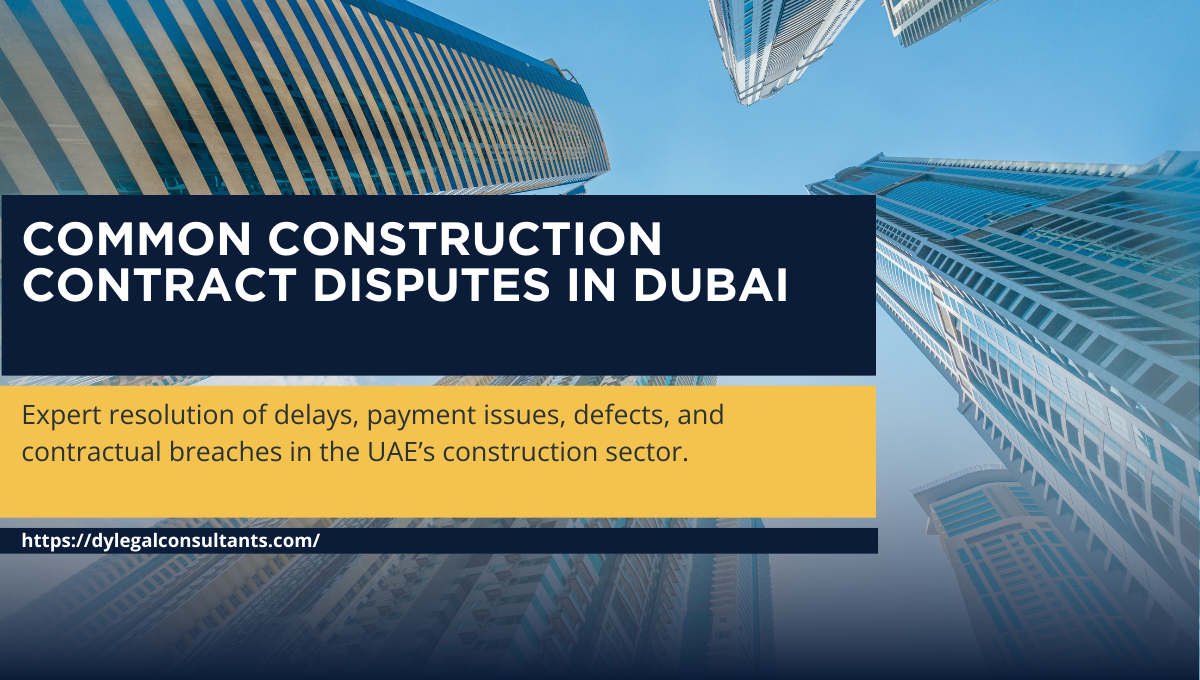
Understanding UAE Construction Contract Law: Key Legal Frameworks
A solid and nuanced grasp of the underlying legal framework is essential for the successful execution and protection of construction projects in the UAE. The firm provides expert guidance deeply rooted in the core legislation governing the sector:
UAE Civil Code (Federal Law No. 5 of 1985)
Articles 872-896 (Muqawala – Contract for Work/Construction)
These articles form the fundamental statutory basis for construction contracts in the UAE. A “Muqawala” is defined broadly as a contract whereby one party undertakes to make a thing or carry out work against a countervalue provided by the other party. While applicable to general services, it specifically governs construction contracts, outlining key responsibilities and relationships. While the Muqawala provisions are foundational; they are notably not exhaustive for all aspects of construction contracts.
For instance, they conspicuously lack specific statutory rules for delay penalties. This often means that general contract law principles within the Civil Code must be applied to fill these gaps, potentially leading to less predictable judicial outcomes compared to jurisdictions with highly specific construction statutes. Furthermore, the acknowledged inadequacy of Articles 890 and 891 regarding subcontracting creates specific complexities around nominated subcontractors and liability, underscoring the need for robust contractual drafting to supplement the statutory framework.
Article 880 (Decennial Liability)
This critical article imposes a strict, joint and several liability on both the architect and the contractor for ten years from the handover of the work. This liability applies to any total or partial collapse of a building or any serious defect that threatens the stability and safety of the building, even if the defect arises from the ground itself (provided it was not a known inherent defect). This strict, long-term liability (10 years) is a fundamental public order principle in UAE law and cannot be easily contracted out of.
It places a significant burden on design and construction professionals, underscoring the paramount importance of meticulous due diligence, rigorous quality control throughout the project, and securing comprehensive professional indemnity insurance for all parties involved in the design and construction process. This liability also directly correlates with the 10-year document retention requirement introduced by the new Dubai Law No. 7 of 2025, ensuring evidence is preserved for the entire duration of potential liability.
Article 390 (Liquidated Damages)
While contracting parties are permitted to pre-agree an amount for damages in their contracts, courts and arbitrators in the UAE retain the inherent power to vary this agreed amount if they find it to be disproportionate to the actual loss suffered. This judicial power cannot be contracted out of. Crucially, UAE law does not draw a formal distinction between a “penalty” and “liquidated damages” as is common in many common law jurisdictions; the overriding focus is solely on ensuring the compensation awarded reflects the actual loss suffered.
This significant judicial discretion over liquidated damages fundamentally impacts contractual certainty for parties accustomed to fixed sums. It means that even meticulously negotiated and clearly defined liquidated damages clauses are subject to judicial review and potential adjustment. This necessitates that parties relying on such clauses must be prepared to demonstrate actual loss in a dispute and understand that the court’s primary objective is compensatory, not punitive.
Article 246 (Good Faith)
This fundamental principle dictates that contracts must be performed not only in accordance with their express contents but also “in a manner consistent with the requirements of good faith”. This overarching principle grants significant judicial discretion to intervene and achieve a “fair outcome,” even if it appears to contradict explicit contractual terms. The unlawful exercise of a right, as defined under Article 106, includes actions that are contrary to good faith, public order, or established custom and practice.
The pervasive principle of good faith introduces a significant layer of judicial discretion that can temper strict contractual adherence, a notable departure from purely literal common law interpretations. This implies that parties must not only draft legally sound contracts but also ensure their conduct throughout the project consistently aligns with principles of fairness, reasonableness, and established custom to avoid challenges based on the “unlawful exercise of a right.” This creates an incentive for parties to act equitably, as a court may intervene if strict contractual enforcement leads to an unfair outcome.
Article 273 (Force Majeure)
This article stipulates that if an event of force majeure supervenes, making the performance of the contract impossible, the corresponding obligation shall cease, and the contract shall be automatically cancelled.
Article 249 (Onerous Performance)
This provision allows for judicial intervention if exceptional events of a public nature, which could not have been foreseen, occur, as a result of which the performance of the contractual obligation, even if not impossible, becomes onerous for the obligor so as to threaten him with grave loss. In such cases, it shall be permissible for the judge to intervene.
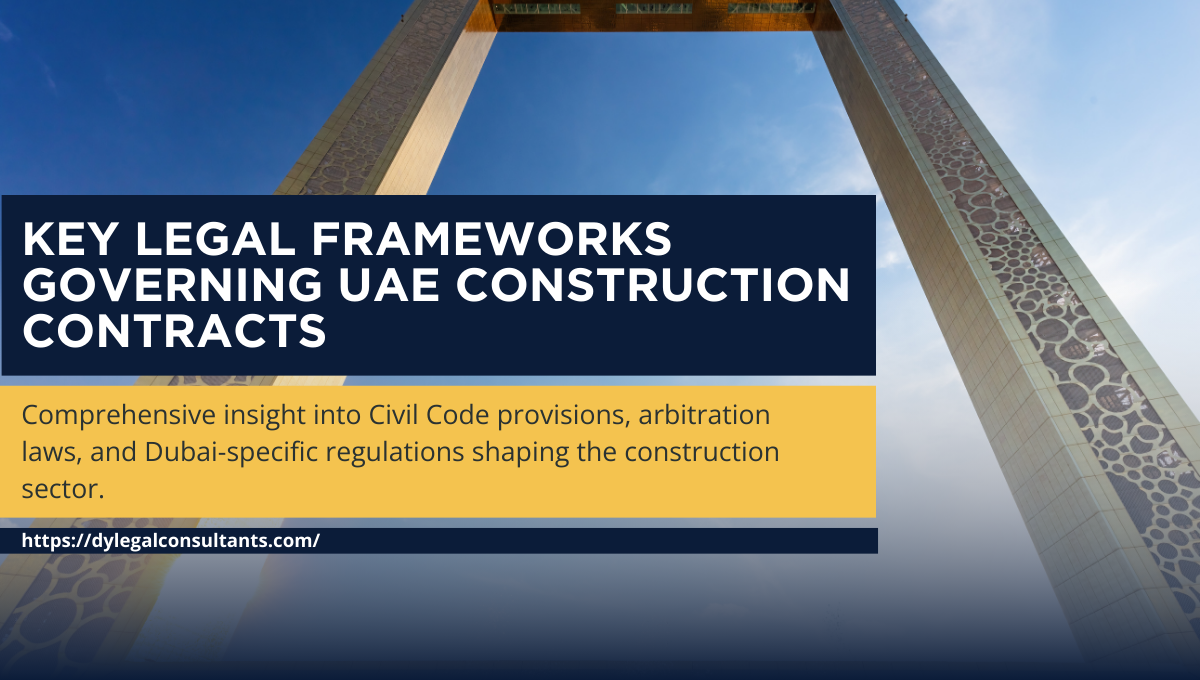
UAE Commercial Transactions Law (Federal Law No. 18 of 1993)
This law is relevant for governing the commercial aspects and transactions inherent in construction agreements, complementing the Civil Code.
Federal Law No. 6 of 2018 on Arbitration
This landmark federal law serves as the primary legislation governing arbitration proceedings across the UAE. Its introduction significantly simplified the process for the enforcement of arbitral awards, establishing a more arbitration-friendly framework within the Emirates.
Local Dubai Laws
Dubai Municipality Regulations
These encompass a wide array of regulations, including those pertaining to building permits, licenses, and approvals, strict adherence to building codes (such as the Dubai Building Code – DBC), and comprehensive health, safety, and environmental standards.20 These regulations are highly detailed, extending to specific technical specifications, and non-compliance carries significant penalties.
Dubai Municipality’s control extends beyond general permits to highly granular technical specifications and mandatory use of approved methods and licensed professionals.23 This level of detailed technical compliance creates a significant layer of legal risk that requires specialized legal and technical understanding to ensure adherence and avoid costly penalties and project delays.
Real Estate Regulatory Agency (RERA) Regulations
These regulations significantly impact development projects, particularly concerning developer registration, the sale of off-plan units, and various property transactions.24 RERA’s broad regulatory scope over developers and property transactions means its rules can profoundly impact the commercial viability, marketing strategies, and legal compliance of construction projects, especially those involving the sale of units off-plan. Developers must navigate RERA’s evolving requirements, such as those related to completion milestones, to ensure smooth project progression and sales.
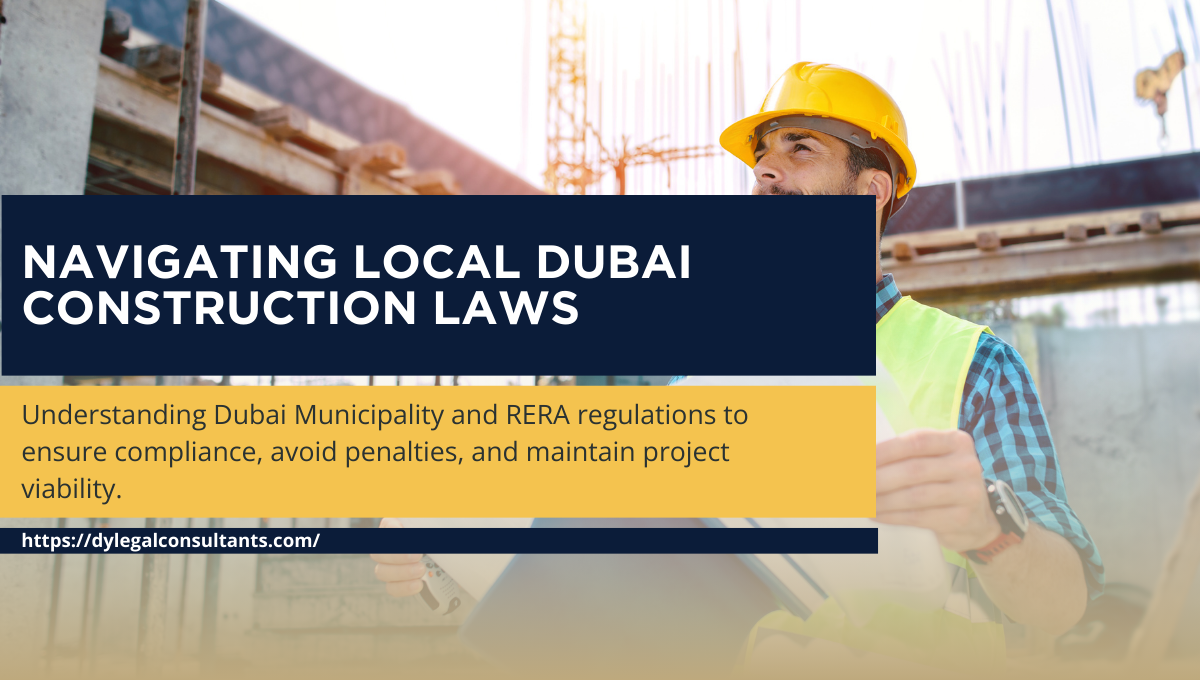
Frequently Asked Questions (FAQs)
What is decennial liability in UAE construction law?
Decennial liability, under Article 880 of the UAE Civil Code, holds the architect and contractor jointly and severally liable for a period of ten years from the handover of the work, for any total or partial collapse of a building, or any serious defect which threatens the stability and safety of the building. This applies even if the defect arises from the ground itself, provided it was not a known inherent defect.
How are liquidated damages treated under UAE law?
Under UAE law, liquidated damages clauses are generally enforceable, but courts and arbitrators have the power to vary the agreed amount if they find it to be disproportionate to the actual loss suffered. This is guided by Article 390 of the UAE Civil Code.
What is the process for resolving a construction dispute in Dubai?
The common methods for construction dispute resolution in Dubai include negotiation, mediation, arbitration (often through DIAC or ICC), and litigation in the Dubai Courts or DIFC Courts. The chosen method often depends on the contract’s dispute resolution clause and the nature of the dispute.
Do I need a local lawyer for a construction contract dispute in Dubai?
Yes, it is highly recommended to engage local construction contract lawyers in Dubai who have in-depth knowledge of UAE laws, court procedures, and cultural nuances. This is crucial for effective representation and navigating the local legal landscape.
How can your firm help with FIDIC contracts in the UAE?
The firm specializes in FIDIC contracts within the UAE context. Assistance is provided with drafting, reviewing, and negotiating FIDIC-based agreements, advising on their interpretation, and handling disputes that arise under FIDIC clauses, ensuring compliance with both FIDIC terms and UAE law.
Disclaimer: The content in this article is provided for informational purposes only and does not constitute legal advice.

